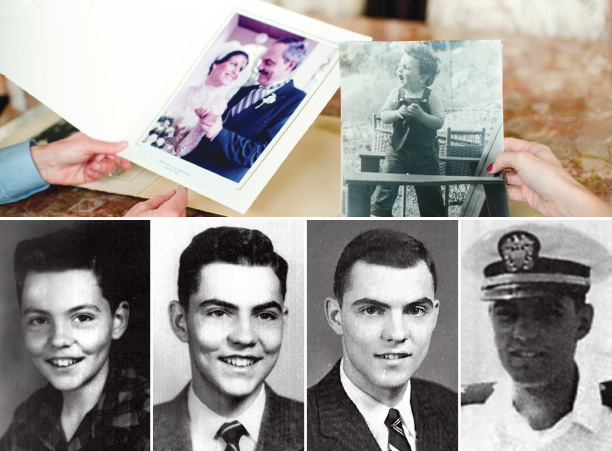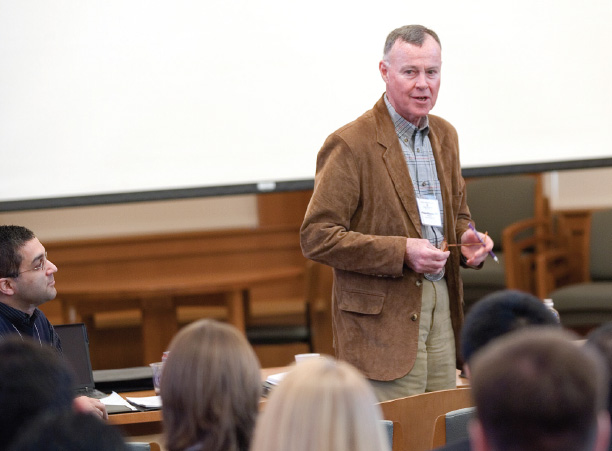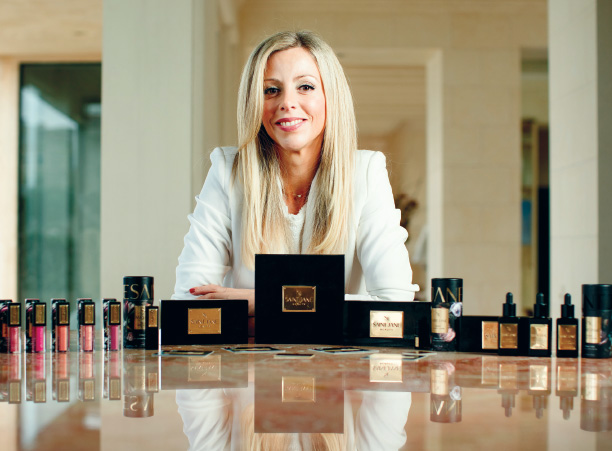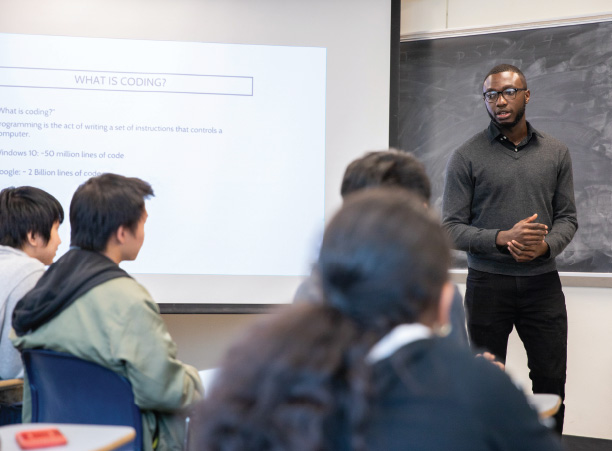Before tech startups flocked to Silicon Valley, before entrepreneurs competed for millions in funding on the TV show "Shark Tank," and before entrepreneurship was part of the cultural zeitgeist in the U.S., Arthur "Art" Ciocca '59 saw entrepreneurship as the future of business.
When he started his family foundation, the Arthur and Carlyse Ciocca Charitable Foundation, Ciocca focused on providing entrepreneurship training and opportunities for college students, with hopes of equipping the next generation of business leaders with the practical skills to succeed and the ethical foundation to do so in a way that adds the most value to society.
Each of these decisions is rooted in his personal philosophy of "thinking like an owner," honed at early jobs where he saw management and higher-ups make decisions he didn't support.
"I would put myself in the owner's shoes and ask myself what I would do if it were me in those situations. That was a turning point for me, where I knew I wanted to control my own destiny and chart a course around a lot of the obstacles I had learned about in these experiences," he says. "Entrepreneurship offered the best opportunity for me to control my own destiny and create maximum value."
For example: When Coca-Cola wanted to get out of the alcohol business in 1981, Ciocca took a risk and bought the wine division, growing it into The Wine Group, the country's second-largest wine company by sales volume. Today, The Wine Group is famous for brands like Franzia, Cupcake Vineyards and Benzinger Family Winery — and its unique, management-owned structure. Unlike other large companies, it is privately owned and accountable to the employees, rather than outsiders.
When The Wine Group's competitors had a cost advantage because they self-manufactured their own bottles, Ciocca led a team that decided to do away with glass bottles entirely. Putting Franzia in that now-famous box with the image of wine pouring into a glass was a disruptive innovation that converted a disadvantage into a huge advantage. It offered Franzia consumers the best value in wine and provided dramatic shelf presence that made it easy to find. In addition, it offered many consumer conveniences. It was easier to pour and store and kept wine fresher longer (after opening); it also provided huge barriers to entry for competitors. As a result, Franzia became the largest wine brand in the industry, a position it has held for years.
Blending Business and Liberal Arts
 Photos of the Cioccas on their wedding day, and Art as a toddler and throughout the years.
Photos of the Cioccas on their wedding day, and Art as a toddler and throughout the years."We wouldn't be where we are with the business program if it hadn't been for Art," says Frank Vellaccio, senior vice president emeritus and special advisor to the offices of the president and advancement, who was involved in the planning and execution of the early years of the program. "Entrepreneurship is so prevalent today, but he was a proponent of this notion and trying to bring it to Holy Cross decades earlier. And that's what a great entrepreneur does: comes up with a great idea before other people have thought of it. He applied his entrepreneurial spirit to his philanthropy."
Ciocca's desire to integrate business training into the liberal arts education at Holy Cross stemmed from the one thing he felt was lacking in his undergraduate experience.
"Holy Cross prepared me very well for life and really helped me refine and solidify my values. It left me with an insatiable curiosity and desire to create ways to solve problems. It also built determination and resiliency in me, all things that were fundamental to succeeding in the world," says Ciocca, who graduated with a degree in English. "But I didn't understand business, so it didn't prepare me for a strong start in the business world."
And after a more than 50-year career — including positions at General Foods, Gallo Winery and Coca-Cola Bottling Company — Ciocca thinks that what the business world needs is more Holy Cross alumni.
"Based upon my experience, I think Holy Cross-educated people have the potential to become highly successful leaders in business and many other areas of life, and that's why I think it is invaluable to help those students get their careers off to a smart start," he says. "That's why one of the biggest focuses of our foundation is principled entrepreneurship. Entrepreneurs who take their satisfaction on the basis of merit — I believe those people create real, long-term, sustainable value for society and for others."
Alumni Executives Rally to Help
 Ciocca's classmate, Bill Maloney '59, who worked alongside Ciocca to invite alumni business leaders to share their knowledge with students
Ciocca's classmate, Bill Maloney '59, who worked alongside Ciocca to invite alumni business leaders to share their knowledge with students"Art and I got on the phone with alums who had agreed to be part of an advisory council, to figure out what we were going to do for this program. And each of them offered to take one day of the weeklong program," Maloney remembers. "Peter George ['81, then-president and CEO of security company Crossbeam Systems] says he'll bring his team of managers and venture capital guys to show them how we build a startup. Brian Kelley ['83, then-CEO of moving company SIRVA] says he'll take Day Two and show how to create a company from mergers and acquisitions. Tommy Patton ['86, then-principal of Vista Advisors, LLC], who had fixed two broken companies, says he'll take Day Three to talk about how you fix companies. For Day Four, Ed Ludwig ['73, then-CEO of Becton Dickinson and Company] says he would bring members of his management team to show students how to sustain growth in an established company. On Day Five, we decided to put a panel together and ask the students to propose a business plan and ask the panel for funding."
Maloney recalls one student noting after the week wrapped up: "This is the best thing I've ever done at Holy Cross."
Inspiring the Next Generation
David Chu was a professor on campus when that first Executive in Residence Program took place. As the business program efforts expanded — spurred by alumni support and the relentless dedication of Ciocca himself — his role expanded to director of the Ciocca Office of Entrepreneurial Studies and prebusiness advisor. Today, in the new Ciocca Center for Business, Ethics, and Society, Chu will coordinate the experiential learning component of the center: the business certificate programs that offer students hands-on experience in the business world and a business certification to put on their resume.
Chu considers Ciocca a mentor and is in constant contact with him about the programming for Holy Cross students.
"Art mails me books that he thinks will be helpful and sends me newspaper clippings about ethical business and entrepreneurship. He pushes me to improve the program content and grow the program," Chu says. "The nice thing about Art is that he is not the type of guy who says, 'I'm going to write the check and I'm out of here.' He's been a wonderful mentor to me, very supportive, and also pushes me."
Ciocca has similarly mentored his niece, Casey Fisher-Georgeson '99. The California native says she never would have thought to go to school on the East Coast, or even considered Holy Cross, if Ciocca hadn't nudged her in that direction.
 Ciocca's niece, Casey Fisher-Georgeson '99, who launched her cosmetics line, Saint Jane Beauty, in January 2019. Photo by Jon Sun
Ciocca's niece, Casey Fisher-Georgeson '99, who launched her cosmetics line, Saint Jane Beauty, in January 2019. Photo by Jon SunToday, Fisher-Georgeson is the vice president of creative at The Wine Group, responsible for new brand ideation and design development; Cupcake Vineyards is one of her signature achievements. And she is an entrepreneur herself, another move she says she wouldn't have made without her uncle's guidance and inspiration. Her cosmetics line, Saint Jane Beauty, launched in January 2019 and uses CBD — an oil that naturally occurs in cannabis plants that Fisher-Georgeson says has beautiful skincare benefits. The name is a nod to the innocent side of the "Mary Jane" nickname, and also references the real-life Catholic St. Jane, who set up a healing center in her home in the 1500s to treat the outcasts of society. The company's female-focused emphasis on wellness is partly inspired by St. Jane.
The former Holy Cross English major says she wishes there had been a program like the Ciocca Center when she was in school, but it is safe to say that spending time with her uncle was like a master class in business.
"I happen to be his niece — but there are so many other young people who have been deeply inspired by his advice and mentorship," she says. "For me, he has not only been a mentor, but also a tremendous support system both personally and professionally. I wouldn't be where I am today without him as my sounding board. Holy Cross is lucky that his lifetime passion for the school has resulted in this extraordinary opportunity for students."
Cultivating Ethical Business Owners
Not only has Ciocca's support made an extraordinary difference for Holy Cross as an institution, but it has done the same for individual students — even those he has never met.
Tolu Akinosho '20, a native of Lagos, Nigeria, who now lives in Providence, Rhode Island, was set on pursuing a career in physical sciences when he arrived at Holy Cross. Then he created a program called Py Coding Academy for Worcester high school students and realized that scientific knowledge alone wasn't enough to get the initiative up and running.
The program — named for the Python programming language — hosts weekly meetings on campus for local high school students who want to learn more about coding and computer programming.
"In the process of putting the program together, I had to write grants to secure funding and form community partnerships, and I began to realize the importance of an entrepreneurial approach," Akinosho says. "I had always felt my interests lay purely in science, but through this process, I started to see a different side of me. I would never have guessed that I would be doing anything that has to do with business. It wasn't that I disliked it, I just never considered it until Holy Cross."
 Tolu Akinosho '20, who is a part of the entrepreneurship certificate program, founded a computer coding program for Worcester high school students. Photo by Avanell Brock
Tolu Akinosho '20, who is a part of the entrepreneurship certificate program, founded a computer coding program for Worcester high school students. Photo by Avanell BrockThis experience, coupled with what he is learning in the entrepreneurship certificate program, has changed Akinosho's future career plans. Now, he wants to combine his interest in science with technology to take discoveries from the lab and devise real-life, practical applications of data — and he knows this certificate is going to help him get there.
"I wouldn't have discovered what I have right now without the Ciocca Center," Akinosho says. "It opens up a path for all students to discover their inner entrepreneur, something they might not have had the chance to do without these resources being available. The center is going to change a lot of lives — like it did with mine."
While Ciocca's impact on generations of Holy Cross students like Fisher-Georgeson and Akinosho is already undeniable, he has no plans to slow down. He says that Holy Cross has only scratched the surface of its potential impact on the business world, with its distinctly liberal arts approach. Through the creation of the Ciocca Center, his dream of more Holy Cross alumni entering the business world with an ethical foundation moves closer to fruition. And he says the world will be better for it.
"My vision, and my best hope for this center, is that I hope it operates just like a startup business, because startups continually challenge themselves to arrive at new solutions," Ciocca says. "If they are open to trying new things and failing — all that comes with a startup — the center can distinguish the College and will turn out principled entrepreneurs who will create enormous value for society."
Written by Maura Sullivan Hill for the Spring 2019 issue of Holy Cross Magazine.
About Holy Cross Magazine Holy Cross Magazine (HCM) is the quarterly alumni publication of the College of the Holy Cross. The award-winning publication is mailed to alumni and friends of the College and includes intriguing profiles, make-you-think features, alumni news, exclusive photos and more. Visit magazine.holycross.edu/about to contact HCM, submit alumni class notes, milestones, or letters to the editor.

